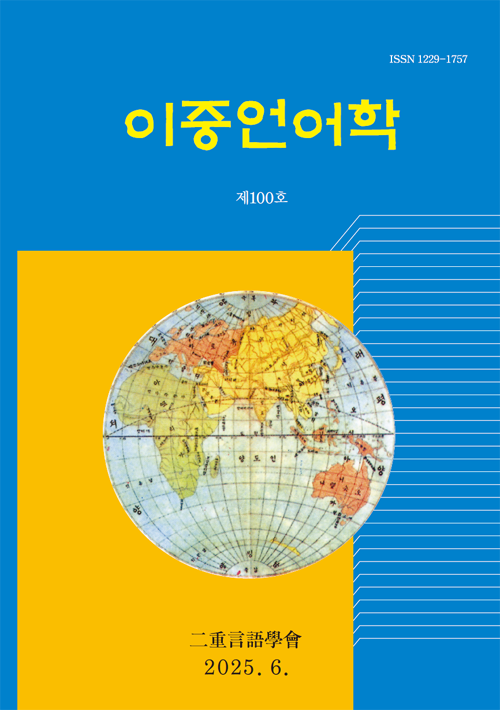- 영문명
- A Study on the Development and Application of a Korean Language Learning Enjoyment Scale for Taiwanese Learners.
- 발행기관
- 이중언어학회
- 저자명
- 유홍빈(Hungpin Yu) 송봉운(Bongwoon Song) 고혜민(Hyemin Go)
- 간행물 정보
- 『이중언어학』제100호, 273~304쪽, 전체 32쪽
- 주제분류
- 인문학 > 언어학
- 파일형태
- 발행일자
- 2025.06.30

국문 초록
본 연구는 대만인 한국어 학습자의 정서적 경험을 분석하고, 이들의 특성에 적합한 감정 척도를 개발·검증하는 것을 목적으로 하였다. 242명의 대만인 학습자를 대상으로 외국어 학습 즐거움(FLE)과 교실 불안(FLCA) 척도를 중국어로 번역하여 적용하고, 레인클라우드 플롯 및 탐색적 요인 분석을 통해 감정 양상을 시각적·통계적으로 분석하였다. 분석 결과, 학습자들은 ‘실수에 대한 긍정적 인식’, ‘수업의 재미’, ‘교사의 격려’에서 높은 즐거움을 느낀 반면, ‘또래 유대감’과 ‘자기표현’ 영역에서는 상대적으로 낮은 점수를 보였다. 불안 측면에서는 ‘즉흥 발화’와 ‘시험 준비 상황’에서 높은 불안이 나타났다. 이를 바탕으로 대만인 학습자에 특화된 새로운 감정 척도(KLES-T, KLCAS-T)를 개발하였으며, 신뢰도(Cronbach's α = .920)와 수렴 타당도 모두 우수한 수준으로 검증되었다. 본 연구는 대만 학습자의 언어 감정을 보다 정밀하게 반영하는 측정 도구를 시범적으로 제공하였으며, 향후 한국어 교육에서 학습자의 정서를 고려한 맞춤형 교육 설계에 실질적인 기초자료로 활용될 수 있을 것이다.
영문 초록
This study aims to analyze the emotional experiences of Taiwanese learners of Korean and to develop and validate an affective scale tailored to their specific characteristics. A total of 242 Taiwanese learners participated in the study, in which the Foreign Language Enjoyment (FLE) and Foreign Language Classroom Anxiety (FLCA) scales were translated into Chinese and applied. Using exploratory factor analysis and Bayesian posterior distribution plots, the learners’ emotional responses were examined statistically and visually. The results revealed high levels of enjoyment in areas such as “positive attitudes toward mistakes,” “fun in learning,” and “encouragement from teachers,” whereas lower scores were observed in “peer bonding” and “self-expression.” Regarding anxiety, learners reported higher anxiety in “impromptu speaking” and “test preparation” situations. Based on these findings, new emotion scales customized for Taiwanese learners (KLES-T and KLCAS-T) were developed. The scales demonstrated excellent internal consistency (Cronbach’s α = .920) and strong convergent validity. This study provides a preliminary yet precise tool for assessing the emotional aspects of Taiwanese learners and offers foundational data for designing Korean language education that reflects learners’ emotional needs more effectively.
목차
1. 서론
2. 선행연구
3. 연구 방법
4. 분석 결과
5. 대만 학습자를 위한 감정 척도 개발
6. 결론
참고문헌
키워드
해당간행물 수록 논문
참고문헌
최근 이용한 논문
교보eBook 첫 방문을 환영 합니다!

신규가입 혜택 지급이 완료 되었습니다.
바로 사용 가능한 교보e캐시 1,000원 (유효기간 7일)
지금 바로 교보eBook의 다양한 콘텐츠를 이용해 보세요!


